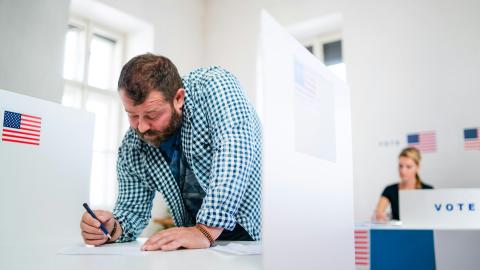Photo Credit: Getty Images / Unsplash
Hundreds of US voters gathered Monday to not only celebrate a historic year in nonpartisan election reform, but also show their support for several 2024 ballot initiatives that promote equal voting rights for all citizens in taxpayer-funded elections.
John Opdycke of Open Primaries and Forward Party Founder Andrew Yang hosted the first-ever Virtual Rally for Open Primaries. The event was organized during an election year in which primary election reform is on the ballot in 7 states and the District of Columbia.
“This – to me – is the path to genuine freedom in America,” Yang said.
6 states could adopt nonpartisan systems that replace party primaries with a single primary that is accessible to all voters and qualified candidates, regardless of party. DC could open its partisan primaries to 73,000+ independent voters.
And, in Alaska, reformers are campaigning to protect the nonpartisan top four primary system adopted by voters in 2020.
Here are all the initiatives in 2024:
Alaska: The “No on 2” campaign is fighting a ballot measure that would repeal the nonpartisan Top 4 primary with ranked choice voting in the general election reform voters approved in 2020.
Arizona - Proposition 140 ends taxpayer-funded partisan primaries in the state and requires state lawmakers or the secretary of state to adopt a nonpartisan system.
Colorado - Initiative 310 implements a nonpartisan Top 4 primary system with ranked choice voting in the general election.
Idaho - Proposition 1 implements a nonpartisan Top 4 primary system with ranked choice voting in the general election.
Montana - CI-126 implements a nonpartisan Top 4 primary system.
Nevada - Question 3 implements a nonpartisan Top 5 primary system with ranked choice voting in the general election.
South Dakota - Amendment H implements a nonpartisan Top 2 primary system.
Washington DC - Initiative 83 opens the city's partisan primaries to independent voters. Registered party members would still vote in their respective party's primary. It also implements ranked choice voting for all District elections.
At stake are the voting rights of over 4 million voters registered outside of the Republican and Democratic Parties, as well as the rights all voters have to a meaningful voice in all stages of the elections process.
“If we are going to reach our full potential as a country, everyone deserves a seat at the table,” Opdycke said.
Monday’s rally was hosted by Open Primaries and the Forward Party, as well as Unite America, Independent Voting, Independent Voter Project, and Veterans for All Voters. Campaign spokespeople were also on hand to explain their proposals and field questions from attendees.
“So many voters are tired of the noise. Legislators have taken an approach from both sides that everything has to be about win-lose,” said David Oclander of Veterans for MT Voters.
“The overwhelming theme I’ve heard from voters is that they want better candidates and they recognize voting reform is a way to begin that process. Voters want lawmakers to stop creating issues and start fixing issues”
Reform advocates agree that the road to better candidates and more accountable representation begins with voting reform, but they also acknowledge that there is no single path to accomplish this shared goal.
There are 5 different approaches to primary reform up for consideration in 2024, something Open Primaries Vice President Jeremy Gruber called “an incredibly diverse and rich landscape of activity” in a previous interview for IVN.
Each of these campaigns speak to unique statewide issues that have become exacerbated under partisan primary systems, including states that have led the way in reform, like Colorado.
Voters in the Rocky Mountain State have adopted an independent redistricting commission and semi-open primaries, but reformers there say more is needed.
“Still, in Colorado, 80% of state elections are single-party districts,” said Jason Bertolacci, chief of staff to former DaVita CEO and election reform activist Kent Thiry. “It just doesn’t work to have partisan primaries."
Thiry has spearheaded many changes to Colorado elections and is behind Initiative 310 in 2024.
Each state has its own issues to tackle, but the reforms in these states face their own challenges as well. Lawmakers in Colorado, for example, quickly and quietly erected barriers to make the road to nonpartisan elections difficult.
While it was a Democratic lawmaker in Colorado that was responsible, Republican lawmakers in Idaho have indicated that if voters approve Proposition 1, they will introduce repeal legislation as early as January.
Party bosses with the most to lose (i.e. the ones in power) tend to be the biggest opponents to reform, even when their own members support change – a further example of how everything for the parties comes down to win-lose.
“There are a lot of Americans that miss the sense of not being beholden to one party or the other or not being super polarized,” said Yang. He added that this despair has activated more independents across the US.
“We can have leaders from our community that go out and make things happen without getting attacked, right or left, for compromising," he said.
The few polls that exist for reform measures in 2024 show tight contests across the board, meaning each campaign will be working hard to shore up as much support as they can get going into Election Day.
